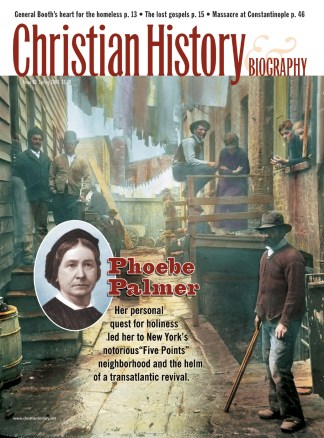I was an unsuccessful, nonachieving child at school, unappreciated and unloved by teachers and peers alike. My real world was my solitary life, in my little back bedroom that looked out onto a courtyard and the windows of other apartments. There, I ate with my feet on the desk and a book on my chest and was completely happy. It was there that I met George MacDonald, the nineteenth-century Scottish novelist (Lilith, Phantastes, Sir Gibbie) and children’s book writer (The Princess and the Goblin, At the Back of the North Wind).
MacDonald’s name sometimes brings up an image of easy comfort, of a world where everything is going to be beautiful as long as we are loving, of a kindly God who never chastises the beloved children. But that image is a false one. Although this prolific writer indeed had a loving heart, his fiction shows that he also had a realistic view of the complexity of human nature.
MacDonald’s own health was precarious. Late in life, his lungs hemorrhaged—and not for the first time—and everything seemed dark. And then he began to write his fantasies.
Above all, it was these fantasies that opened up for me a wider world. The curtain is often pulled aside when things are most difficult or painful, for it is during these times, I have learned, that Christ is closest to us. “The Son of God suffered unto death,” MacDonald wrote, “not that men might not suffer, but that their sufferings might be like his.”
The wise woman is always prominent in his work. North Wind (in At the Back of the North Wind) has to sink a ship, and she explains to young Diamond, “I will tell you how I am able to bear it, Diamond: I am always hearing, through every noise, through all the noise I am making myself, even, the noise of a far-off song. I do not exactly know where it is, or what it means; and I don’t hear much of it, only the odor of its music, as it were, flitting across the great hollows of the ocean outside this air in which I make such a storm; but what I do hear is quite enough to make me able to bear the cry from the drowning ship.”
I cannot understand this strange mercy except in the language which George MacDonald introduced to me. Yet Scripture itself, in which George MacDonald is grounded, is full of this strange language. Ezekiel, with his extraordinary wheels (echoed in John’s Revelation), with his dry bones crying out to God to be enfleshed; Daniel, again echoed in Revelation; even hilarious Jonah—all offer us a world of radiant wildness, where we see brilliance in the forests of the night.
Meeting George MacDonald’s writing when I was very young was a blessing to my understanding of God and creation and our own small but potentially beautiful place in it. As MacDonald makes clear all through his writing, God promises us joy, but not safety; a full life, but not a painless one; the laughter that comes with full faith in God’s loving purpose, but also tears. He promises us a broad road with a narrow gate, with lions and other wild beasts ready to attack unless Love speaks first, and angels are standing by. There are, indeed, manifestations of energies, both good and evil, which we human beings are seldom able to see because we have rejected the world of fantasy and faerie as untrue.
Madeleine L’Engle is author of such children’s classics as A Wrinkle in Time and A Swiftly Tilting Planet as well as many books for adults. This article is adapted from More Than Words, edited by Philip Yancey and James Schaap (Baker Academic, a division of Baker Publishing Group, 2002.) Used by permission.All rights to this material are reserved. Materials are not to be published in other media without written permission from Baker Publishing Group.
Copyright © 2004 by the author or Christianity Today/Christian History & Biography magazine.Click here for reprint information on Christian History & Biography.










